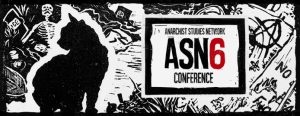I am reader of various books about social ecology, abolition, socialism, anarchism and communism. I am a dreamer for a better world. I am an anarchist in the archipelago known as the Philippines. I am studying for an advance degree in Political Science. This blog is to collect my notes on an anarchist and libertarian reading of Political Science.
Published at Anarchist Studies Blog
Part of a series of articles drawn from the 6th International Anarchist Studies Network Conference, September 2020. Edited excerpt from a longer piece entitled ‘Towards an Anarchism in the Philippine Archipelago’.

On Contextualizing Anarchism
Anarchists in a particular area cannot simply import anarchism wholesale. Anarchism must contextualize itself in the specific contexts of where it exists.
(Continued)
Friday, September 4, 2020
Written for ROAR Magazine.
The COVID-19 pandemic has truly brought out the worst in the Philippine government. Instead of treating the pandemic as a public health crisis, the state is treating it as a security issue and has responded by deploying its extremely violent security apparatus.
(Continued)
States around the world are criminalizing dissent in response to a global and ongoing wave of uprisings.
Written by JN from Lausan and Simoun Magsalin. Written for Lausan.
The COVID-19 pandemic has seen the widespread failure of states across the world to carry out the function of providing healthcare and proper protective resources to its citizens. Many have risen in revolt across the world against this flagrant abandonment by their governments, whose unconscionable exposure of the most vulnerable and marginalized to infection only serves to maintain the flow of global capital. The social chaos that has ensued has created an apt cover for governments to begin consolidating their own power, wielding the threat of “emergency” to ram through legislation that consolidates their unaccountable monopoly on violence.
(Continued)
With the Terror Bill now becoming Terror Law, we can expect an increase of arrests and suppression from the State. Indeed just one day after the signing of the Terror law, eleven protesters were warrantlessly arrested and became known as the Cabuyao 11. It is in this climate that having an abolitionist prisoner support group may be necessity. What follows is a sketch of a Black Cross organization, a proposal for an organization that would do prisoner support and advocate for prison and police abolition. The abolitionist advocacy would be what differentiates the Black Cross from other prisoner support groups.
(Continued)
Umaapaw na raw ang kulungan. [The jails are overflowing.] Nearly 30,000 people were reportedly arrested under the quarantine in the Philippines, with more than 4,000 of these arrested detained, based on a report dated April 18, 2020. Doubtless, more have since been arrested and detained since then. The police even went on record saying there will no longer be any more warnings to the alleged “quarantine violators” and will arrest people as they see fit, likely straining the capacities of the already overstretched jails and prisons.
(Continued)
The Opportunism of Martial Law
In March 2020, the people of the archipelago known as the Philippines were alarmed at the rate of local transmission of the disease known as COVID-19. On March 12, police and military forces were mobilized to enforce a community quarantine for the whole of Metro Manila scheduled to start on the midnight of March 15. This quarantine was later generalized for the whole island of Luzon, a population of some 53 million souls. That the mobilization of the state’s apparatus of violence was more noticeable than the mobilization of medical and social resources is telling of the administration’s priorities.
(Continued)
There is a necessity for a liberatory politics in the Archipelago known as the Philippines and as anarchists we think Anarchism has the framework to fill this need. The dominant forms of politics we have now are insufficient for developing a liberatory politics in the archipelago. This liberatory politics becomes a necessity because politics in the Philippines is currently an alienating affair—a politics done to people rather than people doing politics. We are also dominated by domineering structures and institutions like the market, capitalism, and the state. Against these we forward the liberatory politics of anarchism for a world beyond domination.
(Continued)
